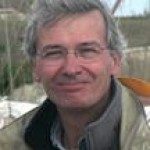Link to Pubmed [PMID] – 7960150
Infect. Immun. 1994 Dec;62(12):5664-8
After lysing the phagocytic vacuole, Shigella spp. accumulate filaments of polymerized actin on their surface at one pole, leading to the formation of actin tails that enable them to move through the cytoplasm. We have recently demonstrated that the Shigella protein IcsA is located at the pole that is adjacent to the growing end of the actin tail (M. B. Goldberg, O. Barzu, C. Parsot, and P. J. Sansonetti, J. Bacteriol. 175:2189-2196, 1993). Not every bacterium that is observed within the cytoplasm has an actin tail. The factors that determine when a bacterium will form a tail are unknown. Here we demonstrate that at the moment of initiation of movement, Shigella spp. are frequently in the process of division. Furthermore, the expression of IcsA on the surface of the bacteria occurs in a growth phase-dependent fashion, suggesting that the surface expression of IcsA per se determines the observed association of bacterial division with movement.

